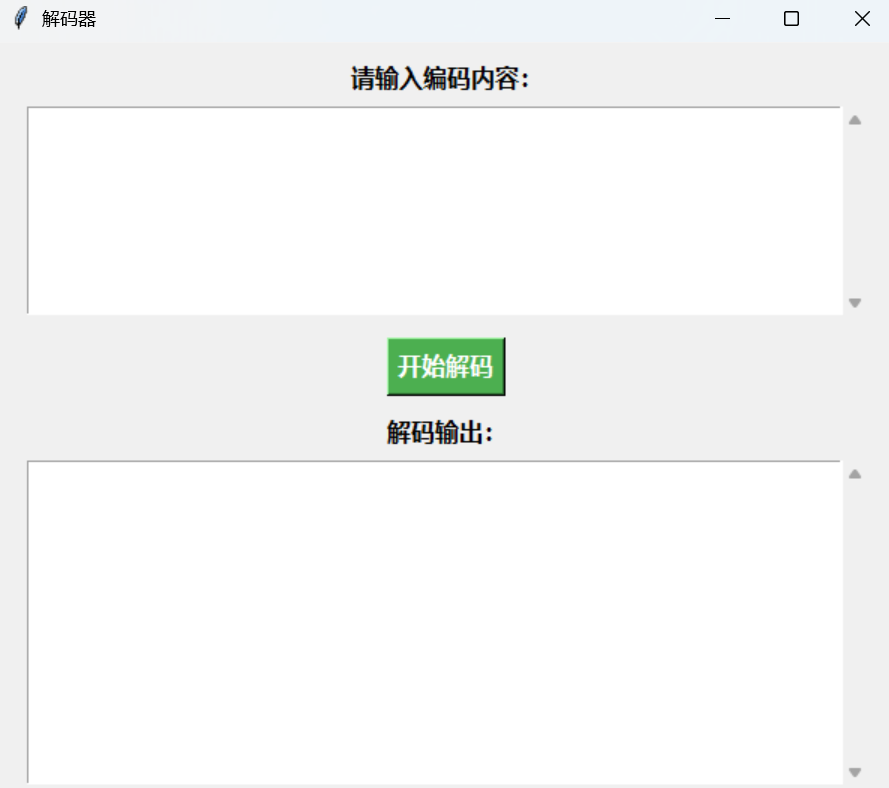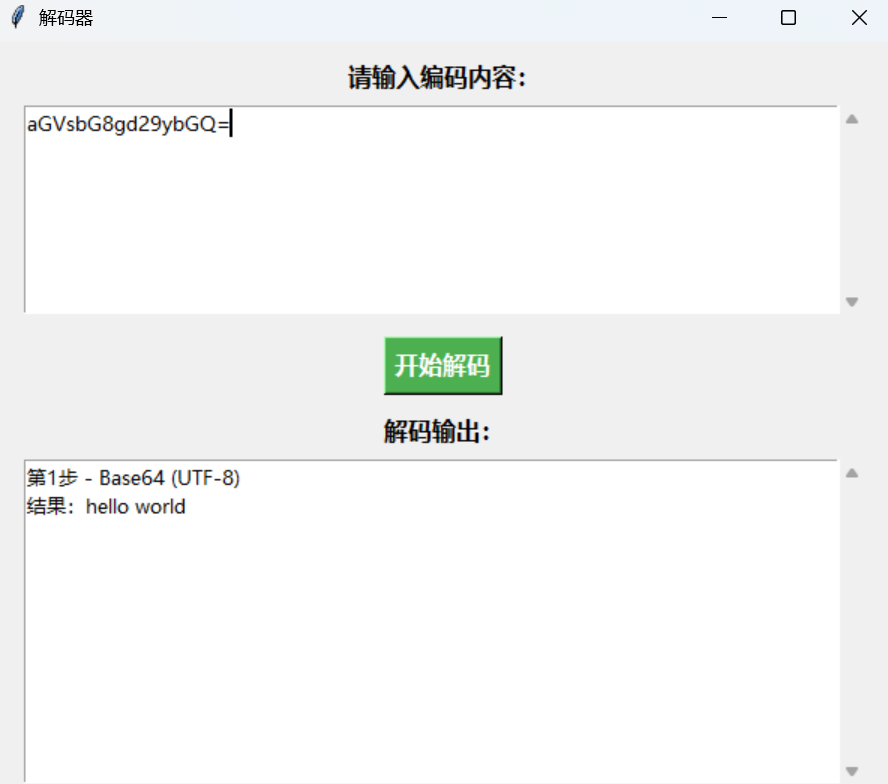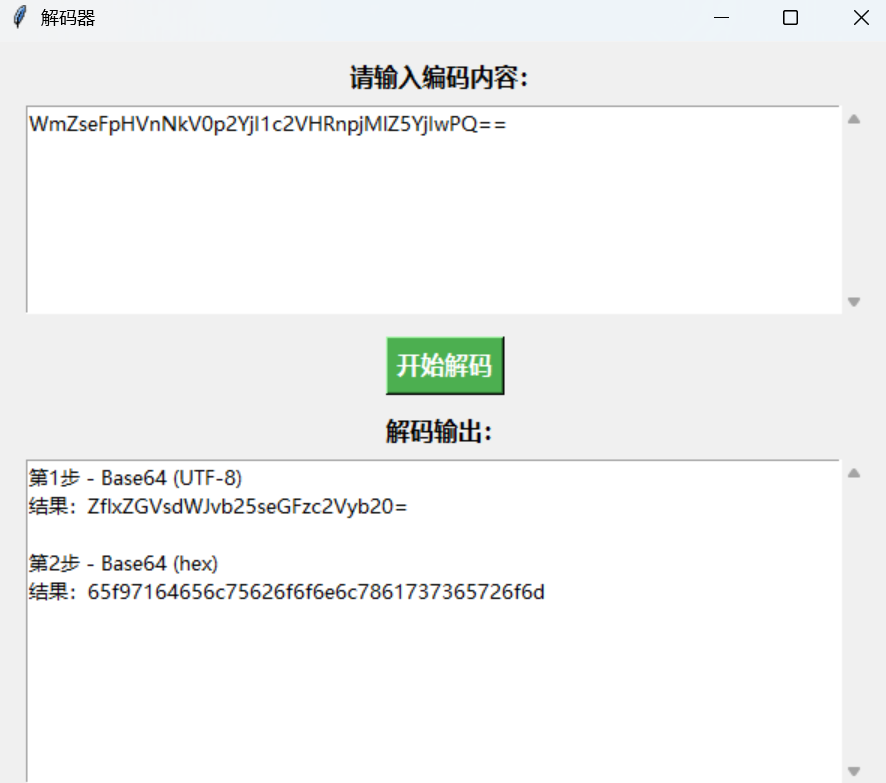1
2
3
4
5
6
7
8
9
10
11
12
13
14
15
16
17
18
19
20
21
22
23
24
25
26
27
28
29
30
31
32
33
34
35
36
37
38
39
40
41
42
43
44
45
46
47
48
49
50
51
52
53
54
55
56
57
58
59
60
61
62
63
64
65
66
67
68
69
70
71
72
73
74
75
76
77
78
79
80
81
82
83
84
85
86
87
88
89
90
91
92
93
94
95
96
97
98
99
100
101
102
103
104
105
106
107
108
109
110
111
112
113
114
115
116
117
118
119
120
121
122
123
124
125
126
127
128
129
130
131
132
133
134
135
136
| import tkinter as tk
from tkinter import scrolledtext
import base64
import re
import base58
import base91
def is_binary(s):
return all(c in '01' for c in s) and len(s) % 8 == 0
def decode_bytes(byte_data):
try:
text = byte_data.decode('utf-8')
return text, True
except UnicodeDecodeError:
return byte_data.hex(), False
def looks_like_base64(s):
return len(s) % 4 == 0 and re.fullmatch(r'[A-Za-z0-9+/=]+', s) is not None
def looks_like_base32(s):
return len(s) % 8 == 0 and re.fullmatch(r'[A-Z2-7=]+', s, re.IGNORECASE) is not None
def looks_like_base58(s):
return all(c in base58.alphabet.decode() for c in s)
def looks_like_base91(s):
return all(33 <= ord(c) <= 126 for c in s)
def try_decode(s, func):
decoded = func(s)
return decode_bytes(decoded)
def recursive_decode(s, path=None, all_paths=None, max_depth=10):
if path is None:
path = []
if all_paths is None:
all_paths = []
if len(path) >= max_depth:
return all_paths
decoders = [
('Base64', looks_like_base64, base64.b64decode),
('Base32', looks_like_base32, base64.b32decode),
('Base58', looks_like_base58, base58.b58decode),
('Base91', looks_like_base91, base91.decode),
('Binary', is_binary, lambda x: bytes(int(x[i:i+8], 2) for i in range(0, len(x), 8))),
('Hex', lambda x: True, lambda x: bytes.fromhex(x)),
]
for name, detector, func in decoders:
if detector(s):
try:
text, is_utf8 = try_decode(s, func)
except Exception:
continue
mode = '(UTF-8)' if is_utf8 else '(hex)'
new_path = path + [(name, text, mode)]
all_paths.append(new_path)
if is_utf8:
recursive_decode(text, new_path, all_paths, max_depth)
return all_paths
def select_final_path(paths):
utf_paths = [p for p in paths if p[-1][2] == '(UTF-8)']
if utf_paths:
max_len = max(len(p) for p in utf_paths)
for p in utf_paths:
if len(p) == max_len:
return p
max_len = max(len(p) for p in paths)
for p in paths:
if len(p) == max_len:
return p
def decode_input():
raw = input_text.get('1.0', tk.END).strip().replace(' ', '')
output_text.delete('1.0', tk.END)
if not raw:
return
paths = recursive_decode(raw)
if not paths:
output_text.insert(tk.END, '无法识别或解码此内容。')
return
final = select_final_path(paths)
for i, (name, text, mode) in enumerate(final, 1):
output_text.insert(tk.END, f"第{i}步 - {name} {mode}\n结果:{text}\n\n")
if len(final) == 1 and final[0][2] == '(UTF-8)':
s = final[0][1]
extra_decoders = [
('Base64', looks_like_base64, base64.b64decode),
('Base32', looks_like_base32, base64.b32decode),
('Base58', looks_like_base58, base58.b58decode),
('Base91', looks_like_base91, base91.decode),
('Binary', is_binary, lambda x: bytes(int(x[i:i+8], 2) for i in range(0, len(x), 8)))
]
for name, detector, func in extra_decoders:
if detector(s):
try:
data = func(s)
hex_out = data.hex()
output_text.insert(tk.END, f"第2步 - {name} (hex)\n结果:{hex_out}\n")
break
except Exception:
continue
root = tk.Tk()
root.title('解码器')
root.geometry('600x500')
font_title = ('微软雅黑', 12, 'bold')
font_text = ('微软雅黑', 10)
tk.Label(root, text='请输入编码内容:', font=font_title).pack(pady=(10,0))
input_text = scrolledtext.ScrolledText(root, height=6, font=font_text, wrap=tk.WORD)
input_text.pack(fill=tk.BOTH, padx=20, pady=5, expand=True)
tk.Button(root, text='开始解码', font=font_title, bg='#4CAF50', fg='white', command=decode_input).pack(pady=10)
tk.Label(root, text='解码输出:', font=font_title).pack()
output_text = scrolledtext.ScrolledText(root, height=10, font=font_text, wrap=tk.WORD)
output_text.pack(fill=tk.BOTH, padx=20, pady=5, expand=True)
root.mainloop()
|







